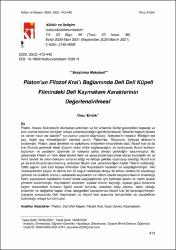Platon’un Filozof Kral’ı bağlamında Deli Deli Küpeli Filmindeki deli kaymakam karakterinin değerlendirilmesi

View/
Access
info:eu-repo/semantics/openAccessDate
2020Author
Anadolu Üniversitesi
0000-0003-4321-5741
Ertürk, Onur
Metadata
Show full item recordCitation
Ertürk O. 2020). Platon’un Filozof Kral’ı Bağlamında Deli Deli Küpeli Filmindeki Deli Kaymakam Karakterinin Değerlendirilmesi. Kültür ve İletişim, 23(46), 413 - 442. Doi: DOI: 10.18691/kulturveiletisim.729014Abstract
Platon, hocası Sokrates’in ölümünün ardından ve bir anlamda Sofist gelenekten koparak ve soru sorma-mevcut yanlışları ortaya çıkarma pratiğini geride bırakarak “İdeal bir toplum düzeni ve devlet nasıl var olabilir?” sorusunun peşine düşmüştür. Sokrates’in meşhur “Bildiğim tek şey, hiçbir şey bilmediğimdir” cümlesi yerini, Platon’da, “Biliyorum, öyleyse dinleyin”e bırakmıştır. Platon, ideal devletini ve toplumunu anlatırken nihayetinde sözü filozof kral ya da kral filozofa getirerek ideal düzenin onlar eliyle sağlanacağını ve dolayısıyla filozof kralların toplumun ve yasaların üzerinde bir konuma sahip olması gerektiğini savunmuştur. Bu çalışmada Platon’un hem ideal devleti hem de yeryüzünde toplumsal olarak kurulabilir en iyi ikinci devleti ile onun bekasını emanet ettiği ve detaylı şekilde tasarlayıp anlattığı filozof kral ya da kral filozofu tanımlanmış; ardından filozof kral, yönetmenliğini Kartal Tibet’in üstlendiği, 1986 yapımı Deli Deli Küpeli filmindeki Deli Kaymakam karakteri ile karşılaştırılmıştır. Akıl hastanesinden kaçan iki delinin kar ve soğuk nedeniyle dünya ile irtibatı kesilen bir kasabaya gelmesi ve rastlantı sonucu kasabada kaymakam ve hâkim olarak karşılanmasının anlatıldığı filmin kaymakam karakterini filozof kralla karşılaştırmak için betimsel analiz ve metin analizi yöntemi kullanılmıştır. Kaymakam karakteri; siyasal erkinin kaynağı, siyasal gücü kullanma biçimi, toplumdaki kurtarıcı figürü olarak konumu, yasalara karşı tutumu, sahip olduğu erdemler ve değişime kapalı olma kategorileri kapsamında filozof kral ile karşılaştırılmıştır. Çalışma sonucunda Deli Kaymakam ve filozof kral arasında benzerlikler ve paralellikler bulunduğu ortaya konulmuştur. Plato pursued the question of how an ideal social order and ideal state could exist after his preceptor Socrates' death, and in a sense, leaving the practice of asking questions and revealing existing mistakes by breaking away from the Sophistic tradition. Socrates' famous phrase "All I know is that I know nothing" left its place in Plato to: "I know, so listen." When describing his ideal state and society Plato argued that the ideal order would be established by the philosopher king or king philosopher, and therefore the philosopher kings should have a position over society and the law. This paper describes both Plato's ideal state and the second best state, as well as the philosopher king or king philosopher whom he entrusted and designed and described in detail; then the philosopher king is compared with the character of the Mad District Governor [Deli Kaymakam] in the 1986 film Deli Deli Küpeli, directed by Kartal Tibet. The film portrays two mentally ill people who escape from the mental hospital, arrive in a town that has lost contact with the world due to snow and cold, and are unexpectedly welcomed as District Governor and Judge of the town. The study aims to compare and analyze philosopher king with the mad district governor character in the Deli Deli Küpeli film within the framework of categories of source of their political power, their use of political power, their role as a savior figure in society, their attitude the law, their virtues, and their closeness to change. Descriptive analysis and text analysis methods are employed for this purpose. Within the scope of the study, it is determined that there are similarities between the mad district governor and the philosopher king.

















